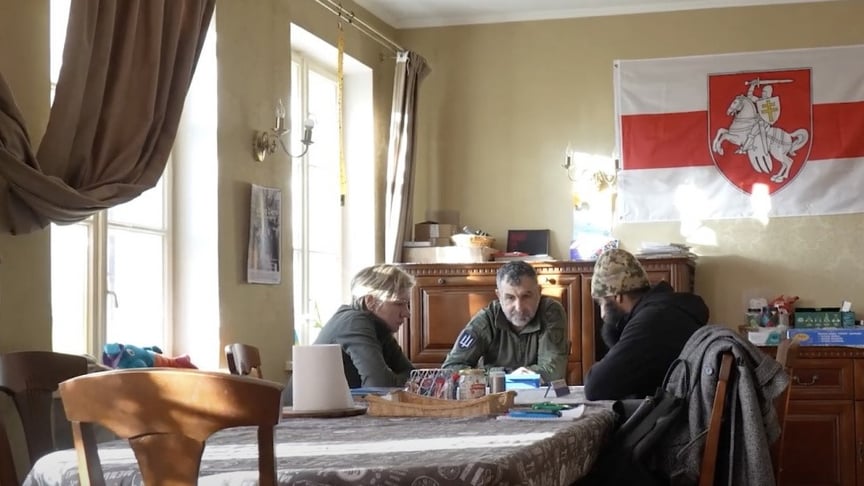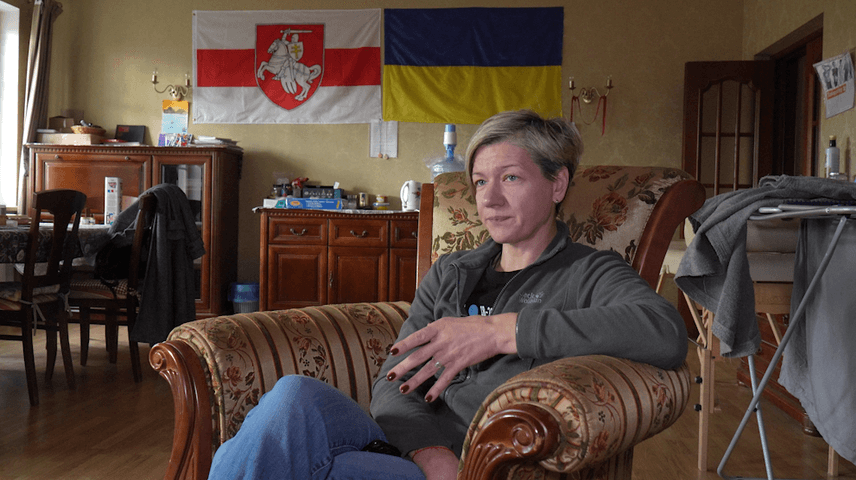"No difference here—Georgian, Ukrainian, Belarusian, Colombian." Discover how the rehabilitation center "Lanka" operates near Kyiv.
 5
5“I took a one-way ticket”
The rehabilitation center “Lanka” in the Kyiv region was opened by Tatyana Hatsura-Yavorska. In the spring of 2022, she arrived in Ukraine from Belarus. Tatyana had to leave her country secretly. Since 2006, she had been involved in human rights protection there and later founded the human rights organization “Zvyano.” However, following the protests in 2020, Lukashenko's regime viewed such activities as a direct threat. An investigation was launched against Tatyana, and she was subsequently arrested.
“I spent 10 days in pre-trial detention — that’s the maximum time before you must either be charged or released. I was released without charges. While I was in detention, they conducted another search. They beat my husband and demanded passwords for my devices. He was told he had 48 hours to leave and ensure his safety. If he didn’t, he would also be arrested and then deported,” Tatyana recalls.
 6
6The authorities threatened to send Tatyana's child to a social shelter, prompting her husband to decide to leave. Although Tatyana was not formally charged, she was released as a suspect with a ban on leaving Belarus.
“I submitted a request asking for permission to leave the country for 10 days to see my family. There is a procedure for people with such a status to be granted this permission, but I was denied. I applied twice. The last time was in January 2022. I was denied again,” the human rights activist explains.
Tatyana was in Minsk when the full-scale war began. She recalls the protests of that time, despite the fact that most activists had already left Belarus or were in detention.
“It seemed that many were so frightened, as protesting in the streets was likely to lead to criminal charges. But many people came out. When we were detained, we sat in a garage; there were people from different social strata. There were businessmen, young people, and retirees,” Tatyana remembers.
 7
7It was after the onset of the full-scale invasion that Tatyana Hatsura-Yavorska decided to leave Belarus. She had to leave illegally. Upon arriving in Ukraine, she immediately began volunteering — raising funds to purchase vacuum therapy devices for hospitals. According to the human rights activist, the Belarusian diaspora in Italy made a significant contribution to this effort.
“They coordinated to transport these devices to Ukraine, bypassing the distributor. Doing it through a representative would have been much more expensive. We raised over 100,000 euros over two years and transported not only the devices but also consumables. This is a very important treatment method for patients with serious injuries. The devices remove all dirt and fluids from the wound, preventing infection. This helps avoid amputations,” Tatyana Hatsura-Yavorska states.
Volunteering immersed Tatyana in the realities of war. She visited hospitals, spoke with doctors, saw the wounded, and soon decided to open the rehabilitation center “Lanka.”
“We call 'Lanka' a family-type rehabilitation center”
Currently, five servicemen are undergoing treatment at “Lanka” — three Georgians and two Belarusians. Gio arrived in Ukraine in the spring of 2022. He is originally from Georgia, but when the major war began, he was working in Germany. He explains his decision simply: during the war in 1992-1993, only Ukrainians helped Georgia.
In Ukraine, Gio served in the First Georgian Legion and then in the Special Operations Battalion of the Ministry of Defense of the Chechen Republic of Ichkeria. This is a volunteer unit from the International Legion of Territorial Defense of Ukraine. In April 2024, Gio was injured.
“We were in Chasiv Yar. Four of our guys were on a mission, and one was killed. A 128-mm mortar fired shells, and one shrapnel hit me in the eye. They performed surgery, and now I can’t see,” Gio shared.
Tatyana's friend Zurab, who is also rehabilitating at “Lanka,” fought alongside Gio. Gio refers to him as his bodyguard. When Gio was injured, Zurab came to get him and pulled him out.
 8
8Since the establishment of “Lanka,” over 60 people have undergone rehabilitation here, many of whom are foreign volunteers.
“Any decent person who sees what the Russians are doing is morally obliged to come here. Some people say, 'This is not our war.' It is our war. If Europeans allow the Russians to win here, no one will be free. This is a fight for our common freedom,” believes Belarusian volunteer Andrey (name changed).
In addition to Georgians and Belarusians, the center has treated Russians, Colombians, Canadians, and Swedes — the geographical reach is extensive. Tatyana Hatsura-Yavorska also sees helping not only Ukrainians but also foreigners as part of “Lanka’s” mission.
“Ukrainians who serve have families, relatives, social ties, and their own homes. Foreigners who come to fight in Ukraine lack this. They often don’t even speak the language well. It’s not easy for them. If a person arrives in the hospital with an injury, they often don’t understand what’s happening around them. Doctors don’t have time to use a translator to explain anything. We realized we could be useful for this category of soldiers,” Tatyana explains.
At “Lanka,” servicemen recover from injuries to their arms, legs, and backs; they can also come here for gastroenterological or neurological issues. For example, Zurab is treating protrusions and rehabilitating from a concussion at “Lanka.”
“A person contacts us, explaining their issue. We get in touch to find out what they really need to determine if we can help or not. Some problems may require hospitalization. It could also be that someone has a severe addiction, and we can’t handle that. The doctor orders initial examinations and diagnostics. We schedule the person for all these procedures, examinations, and consultations,” Tatyana explains.
Over its existence, “Lanka” has developed social connections and now collaborates with the Kyiv City Children’s Diagnostic Center in the Darnytskyi district of the capital and the clinic of Ruslan Serhiyenko. The team already has a network of doctors who help servicemen for free. These specialists include urologists, gastroenterologists, neurologists, cardiologists, orthopedists, surgeons, and rehabilitation specialists.
If a patient needs another specialist, Tatyana and her team search for them in private clinics, but for the soldiers, it’s still free, as is their accommodation at “Lanka.” If necessary, soldiers are taken for therapeutic exercises and hydrotherapy, and they are provided with a diet.
 9
9“We have a minimum stay of 10 days because military personnel are often given leave for this period. However, we’ve had two long-term residents who stayed for 4-5 months. This is the time when a person arrives, is cared for, realizes that something is wrong with their health, and receives help to recover,” Tatyana says.
In parallel, soldiers can participate in pottery and wood carving classes. Various activities are created for them, but the most important thing is the feeling of home warmth that surrounds the fighters, according to Georgian Gio.
“I feel at home both here and there. There is warmth for the souls here. Souls are helped. There’s no difference — Georgian, Ukrainian, Belarusian, Colombian,” Gio shares his impressions.
 0
0After rehabilitation, many volunteers maintain relationships and remain friends.
“You know, there are family-type orphanages. Our rehabilitation center is a family-type center. In most cases, people come because they lack family, those warm relationships, and that support. And I really think that is the most important reason they come,” Tatyana believes.
Financially, “Lanka” is supported by the Belarusian diaspora, the organization “Volunteer Hundred,” the “Revival” fund, and donations play a significant role as well. Additionally, volunteers from various countries regularly visit the center to assist the volunteers.
Neither to return nor to stay
After rehabilitation at “Lanka,” Gio plans to return either to the front lines or to units that are involved in security. Zurab also intends to go back to the front. They have no other options, as volunteers in Georgia face criminal prosecution. Gio recounts that this happened to one of his friends, who was sentenced for fighting on Ukraine's side. The volunteer was later pardoned by President Salome Zourabichvili.
“There are problems with the state there, and there are problems here. For the Georgian state, we are all terrorists,” Gio states.